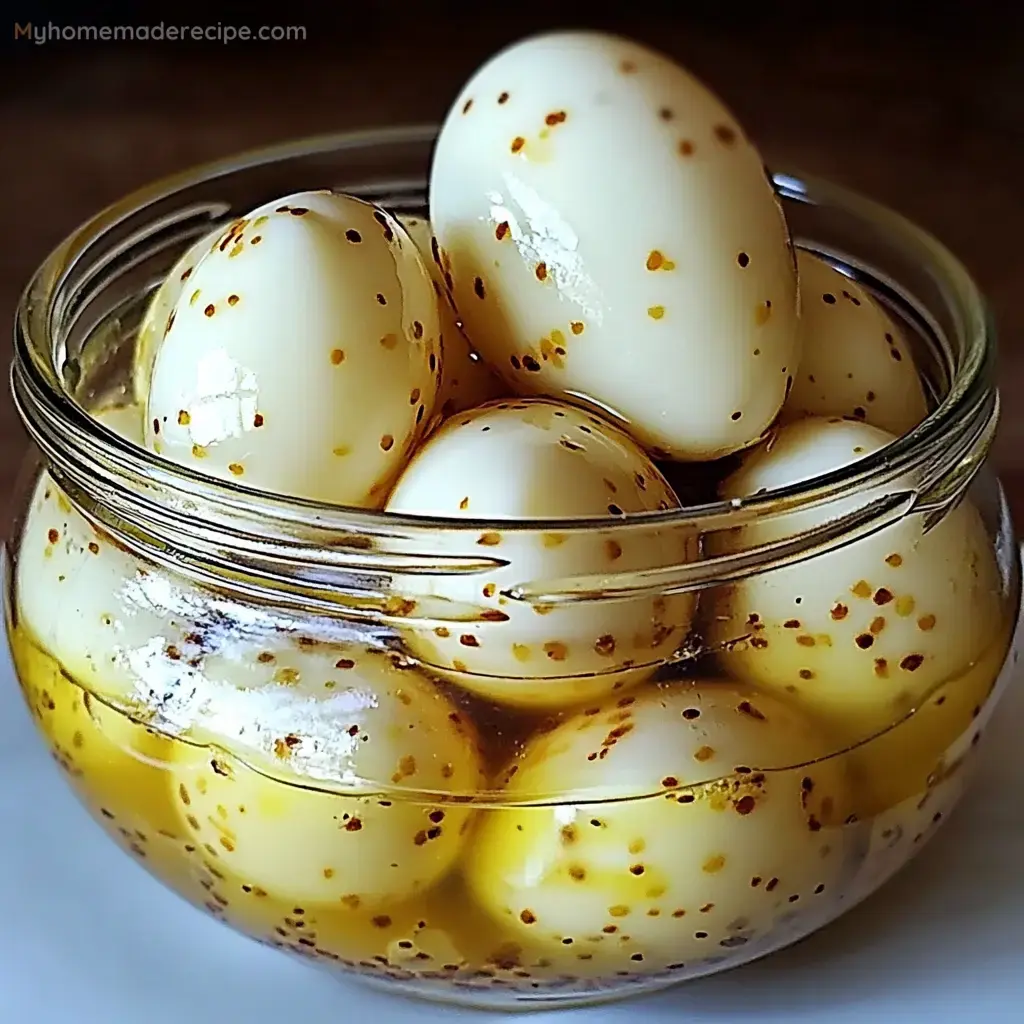Mustard Pickled Eggs are a delicious, tangy treat that will add a zesty flavor to any meal or snack. This recipe brings together the classic pickled egg with a vibrant mustard brine, infusing the eggs with a unique and savory taste. These eggs are perfect on their own, added to salads, or even sliced and served with charcuterie boards. With their bright yellow color from the turmeric, they’re not just tasty but also visually appealing, making them a fun and flavorful addition to your kitchen.
Let’s dive into the key ingredients you’ll need to create this flavorful pickled egg recipe.
Ingredients
- Hard-Boiled Eggs: 1 dozen hard-boiled eggs serve as the base of this dish. Be sure to peel them carefully to keep the surface smooth for even pickling.
- White Vinegar and Water: A mixture of 1 cup of white vinegar and 1 cup of water forms the tangy base of the pickling brine, ensuring the eggs are fully infused with flavor.
- Granulated Sugar: 1/2 cup of sugar balances the tanginess of the vinegar, creating a slightly sweet and tangy brine that complements the mustard seeds.
- Mustard Seeds and Celery Seeds: 1/2 cup of mustard seeds and 1/4 cup of celery seeds add a savory, slightly spicy kick to the brine, making each bite of the eggs full of flavor.
- Turmeric Powder: 1 teaspoon of turmeric powder gives the brine its signature yellow hue while adding a subtle earthy flavor to the eggs.
- Salt: 1 tablespoon of salt enhances all the flavors and helps preserve the eggs as they pickle.
Instructions
- Step 1: Prepare the Brine
- In a medium saucepan, combine 1 cup of white vinegar, 1 cup of water, 1/2 cup of granulated sugar, 1/2 cup of yellow mustard seeds, 1/4 cup of celery seeds, 1 tablespoon of salt, and 1 teaspoon of turmeric powder. Stir the mixture as you bring it to a boil. Make sure all the sugar and salt dissolve completely. Once the mixture boils, remove it from the heat and allow it to cool to room temperature.
- Step 2: Prepare the Eggs
- While the brine cools, peel the 1 dozen hard-boiled eggs. Make sure to handle them carefully to avoid any cracks, as this will help them pickle evenly.
- Step 3: Add Brine to Eggs
- Place the peeled eggs into a clean, sterilized jar or container with a lid. Once the brine has cooled to room temperature, pour it over the eggs. Make sure all the eggs are fully submerged in the brine. If needed, use a small plate or a clean weight to keep the eggs submerged.
- Step 4: Refrigerate
- Seal the jar or container with a lid and place it in the refrigerator. Let the eggs pickle for at least 5 days before eating to allow the flavors to fully develop. The longer they sit, the more flavorful they become.
- Step 5: Serve
- After 5 days, the pickled eggs are ready to enjoy. You can serve them whole, sliced, or chopped, depending on how you want to use them. They make a great snack, addition to salads, or topping for a charcuterie board.
Serving and Storage Tips
- Once pickled, these Mustard Pickled Eggs are perfect served whole as a snack or appetizer, or sliced into salads or sandwiches for an extra tangy kick. They also make a great addition to a charcuterie board, adding a pop of color and flavor.
- The pickled eggs can be stored in the refrigerator for up to 2-3 weeks. The flavors will continue to develop as they sit, so they might taste even better after the first week.
- Be sure to keep the eggs fully submerged in the brine while storing them to ensure even pickling and preservation.
Helpful Notes
- If you want a spicier version of these pickled eggs, feel free to add some red pepper flakes or sliced jalapeños to the brine.
- For a more vibrant yellow color, you can increase the amount of turmeric used in the recipe. Just be mindful that turmeric has a strong flavor, so a little goes a long way.
- These pickled eggs are a great way to use up leftover hard-boiled eggs from events like Easter or other family gatherings.
Tips from well-known chefs
- Rachael Ray: Try using these pickled eggs as a base for a deviled egg recipe, swapping the usual boiled eggs with these tangy pickled ones for a flavorful twist.
- Ina Garten: Add a bit of Dijon mustard to the brine for an extra layer of flavor, making the mustard element even more pronounced.
- Alton Brown: For a quicker infusion of flavor, gently prick the eggs with a fork before placing them in the brine to allow it to penetrate more quickly.
 Pin it
Pin it
